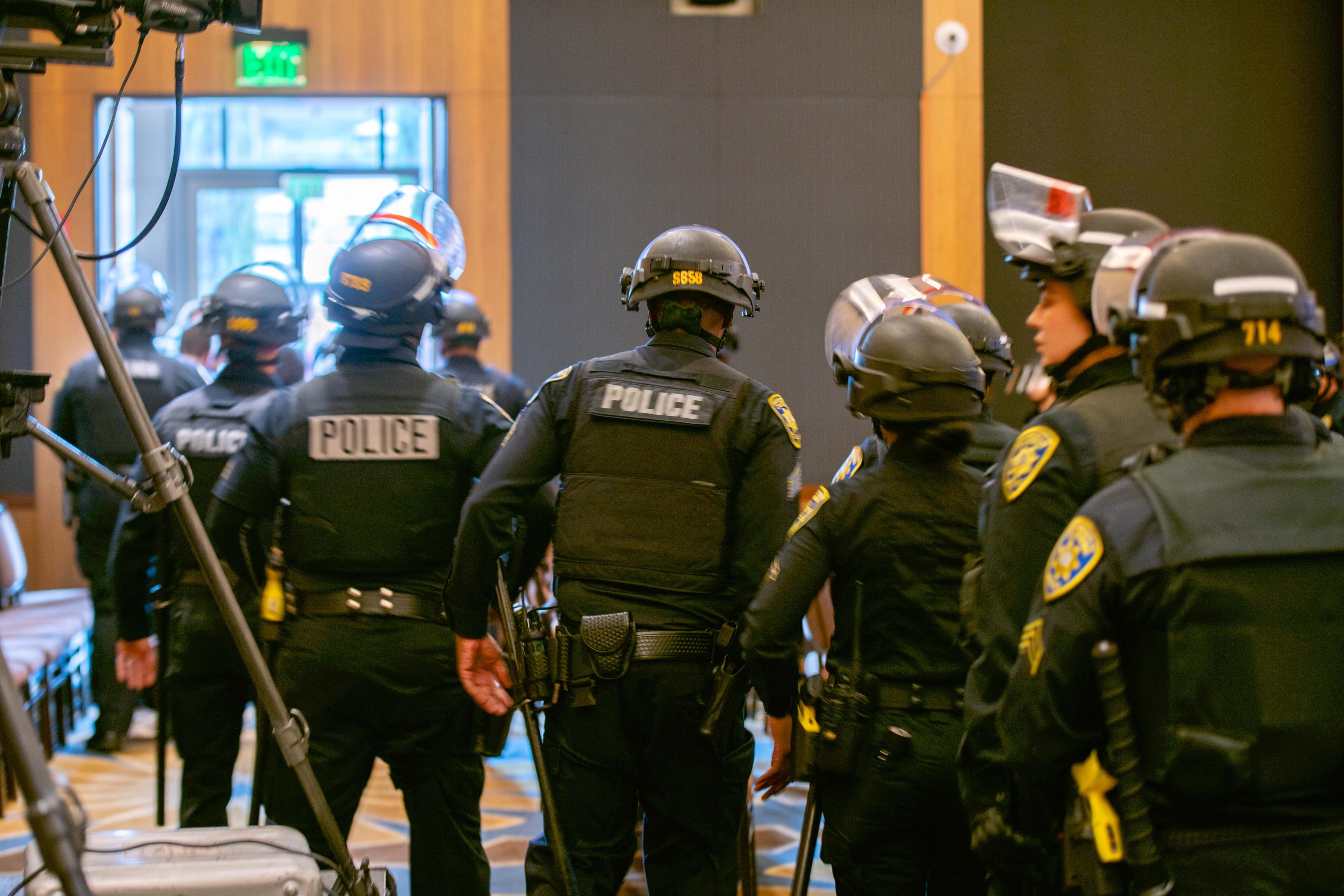USAC passes resolution criticizing regents’ allocation of weapons, drones to UCPD
UCPD officers in riot gear line up inside the Meyer and Renee Luskin Conference Center during the UC Board of Regents’ meeting Sept. 19. The Undergraduate Students Association Council passed a resolution Oct. 1 condemning the regents’ passage of Item C1 and the police response to a protest at the meeting. (Sam Mulick/Daily Bruin senior staff)
By Shiv Patel
Oct. 15, 2024 4:53 p.m.
This post was updated Oct. 16 at 12:49 a.m.
The Undergraduate Students Association Council unanimously passed a resolution Oct. 1 condemning the UC Board of Regents’ allocation of drones and less-than-lethal weapons to UCPD.
The resolution, primarily sponsored by General Representative Tommy Contreras, criticizes the regents’ passage of Item C1 during their Sept. 19 meeting at UCLA. The item allocated pepper bullets, munition launchers and drones to the UCLA police department pursuant to California State Assembly Bill 481.
A spokesperson for the UC Office of the President later told the Daily Bruin the drones purchased were intended for “search and rescue” missions, crime scene reconstruction and the gathering of aerial data. Although UCPD used a drone to police Oct. 7 protests, it was separately owned by a neighboring agency, not one of the ones authorized by the regents.
The resolution states there is nothing that warrants the request of military-grade equipment, adding that the use of less-than-lethal weapons – such as rubber bullets – may result in serious injury or death.
Contreras, a third-year political science and public affairs student, said he sponsored the resolution because he believes Item C1 does not represent the values and mission of the UC.
“We should be spending our money funding education, not student suppression and weaponizing our campuses,” he said.
During deliberation for Item C1, protesters disrupted the regents’ meeting. The disruption was deemed to be an unlawful assembly, leading about 40 UCPD officers in riot gear to surround the protesters and escort them from the room. The resolution also condemned the police response.
“USAC condemns the University of California Regents’ decision to deploy riot police against peaceful protestors exercising their First Amendment rights to free speech and protest,” the resolution reads.
California Penal Code 403 makes it illegal to disturb a lawful public meeting.
Despite this, Contreras said he believes the protesters at the regents’ meeting had the right to express their opinions, adding that he would hold the same view if protesters disrupted a USAC meeting.
“I believe fervently in the right to free speech and the safety of our students,” he said. “That will always be at the forefront of actions taken by UCLA General Representative Number 2.”
Eight other council members co-sponsored the resolution, and 15 supporting organizations – including Bruin Democrats, for which Contreras is the social director – expressed their support for the resolution.
A spokesperson for Bruin Democrats said in an emailed statement that the organization co-sponsored the resolution – and another resolution passed by USAC the same night condemning UCLA’s interim Time, Place and Manner policies – because the resolutions are in line with the organization’s mission.
“Bruin Democrats cares equally about the right to free speech and the right of students to protest,” the statement said.
A spokesperson for the UC Office of the President said in an emailed statement that UCPD’s equipment is not military-grade and is intended to provide “non-lethal alternatives to standard-issue firearms.”
The spokesperson added in the statement that free speech is one of the UC’s values but said the protesters must abide by laws and campus codes of conduct.
“We do all we can to facilitate freedom of expression and a vibrant exchange of ideas, while also maintaining a safe environment and access to University facilities for all members of our community,” the statement said. “At the same time, all members of the UC community remain subject to all applicable laws, policies, and relevant codes of conduct, even while engaging in protest activities.”
